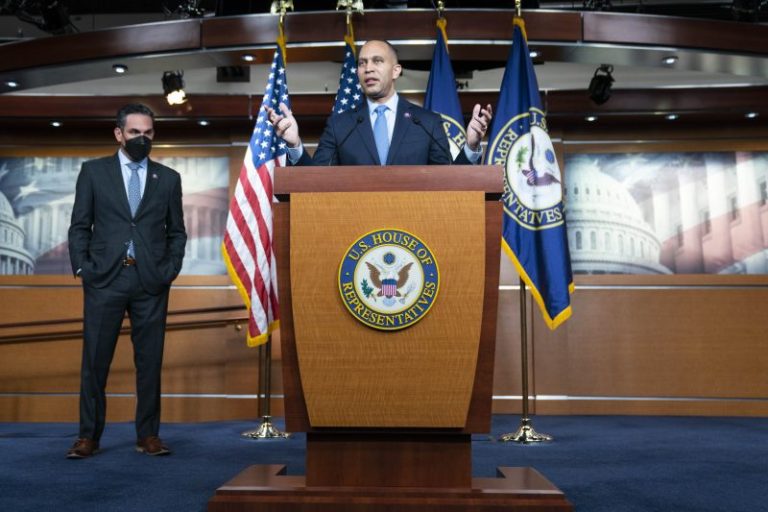Rep. Hakeem Jeffries (D-N.Y.) is poised to succeed a history-making woman and make history of his own.
House Speaker Nancy Pelosi (D-Calif.), the first woman to hold that position, announced Thursday that she would step down as the top Democrat, paving the way for Jeffries, 52, chairman of the House Democratic Caucus, to seek the job. If elected by House Democrats, Jeffries would become the first Black lawmaker to lead a party in Congress.
In a statement, Jeffries paid tribute to Pelosi but made no mention of his plans to seek the leadership job, although his move has been widely reported. Pelosi “is the most accomplished Speaker in American history and our country is unquestionably better off for her extraordinary leadership.” He went on to call her “the steady hand on the gavel during some of the most turbulent times the nation has ever confronted.”
Jeffries, in a nod to their history-making rise in the House, added: “The Speaker often reminds us that our diversity is our strength. I know we will draw on that wisdom as we come together as a Caucus to begin a new chapter.”
One of Pelosi’s longtime colleagues, House Majority Leader Steny H. Hoyer (D-Md.), announced that he also will step down from his leadership post. Jeffries is expected to be joined by Reps. Katherine M. Clark (D-Mass.) and Pete Aguilar (D-Calif.), who will seek the No. 2 and No. 3 positions, respectively.
Rep. James E. Clyburn (D-S.C.) will leave his post as House majority whip but become an assistant leader, a position that will now be fourth in the leadership structure.
Jeffries, a lawyer, is from central Brooklyn, the epicenter of New York’s Democratic power. He is a self-described progressive who has forged relationships with Democratic establishment figures in Washington while navigating the ascending left in his backyard.
He took office in 2013 and has been chair of the House Democratic Caucus, a leadership post, since 2019. In that role, he has been the youngest member of leadership.
With the moves on Thursday, House Democrats were on the cusp of significant generational change — from octogenarians such as Pelosi, Hoyer and Clyburn, to Jeffries; Clark, 59; and Aguilar, 43. Leadership elections are the week of Nov. 28, and the party appeared unified behind the new slate.
In an interview with the Atlantic last year, Jeffries described where he fit into in today’s political landscape, saying, “I’m a Black progressive Democrat concerned with addressing racial and social and economic injustice with the fierce urgency of now.” He added, “There will never be a moment where I bend the knee to hard-left democratic socialism.”
Jeffries, a graduate of the State University of New York at Binghamton, Georgetown and New York University Law School, was first elected to the New York State Assembly in 2006, after unsuccessfully challenging a Democratic incumbent favored by the Brooklyn Democratic machine, Roger Green. After Jeffries lost an earlier challenge to Green, Democratic lawmakers promptly redrew the assembly district to exclude Jeffries’s home at the time.
The blatant move to stifle a young, striving political talent became the subject of a documentary in 2010 about gerrymandering. In that film, Jeffries was the reform-minded politician challenging the establishment.
Jeffries was elected to Congress in 2012 after longtime Rep. Ed Towns abruptly announced that he would not seek reelection. Jeffries was widely expected to win after Towns’s departure but suddenly faced a primary challenge from Charles Barron, a Black Panther and longtime officeholder in New York. The fear that Brooklyn could send Barron to Congress prompted a national effort by establishment Democrats to support Jeffries, which proved successful.
Once in Congress, Jeffries represented not only a mix of liberal and establishment politics, but also youthful Brooklyn swagger.
He once paid tribute to the slain rapper from his district, Christopher Wallace, better known as the Notorious B.I.G. Jeffries called Wallace “the classic embodiment of the American Dream.”
He invoked several of the rapper’s stage names in 2017, adding: “Biggie Smalls, Frank White, the king of New York. He died 20 years ago today in a tragedy that occurred in Los Angeles. But his words live on forever.”
Then Jeffries rapped lyrics from one of the rapper’s most celebrated songs, “Juicy”: “It was all a dream/ I used to read Word Up magazine/ Salt-N-Pepa and Heavy D up in the limousine/ Hangin’ pictures on my wall/ Every Saturday Rap Attack, Mr. Magic, Marley Marl.”
In 2015, Jeffries considered running for mayor of New York City, as the Democratic mayor at the time, Bill de Blasio, failed to deliver on his campaign promise of wholesale changes to the city’s widely criticized policing tactics.
In 2020, Jeffries served as an impeachment manager in President Donald Trump’s first impeachment trial, a reflection of Pelosi’s trust in him.
Jeffries also helped sharpen Democrats’ message as he frequently hit the campaign trail and was available for interviews with reporters.
In 2020, House Minority Leader Kevin McCarthy (R-Calif.) called for Joe Biden to suspend his presidential campaign during the Senate trial of Trump. When a reporter asked Jeffries about McCarthy’s comment, Jeffries, the New York Times wrote, simply replied, “Who?”
If elected Democratic leader, Jeffries will find himself tangling with McCarthy, who is seeking the speakership in next year’s Republican-controlled House.

